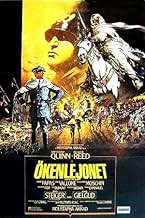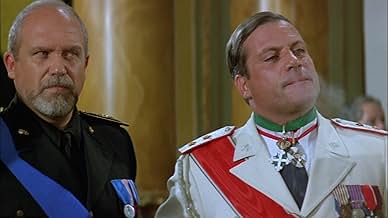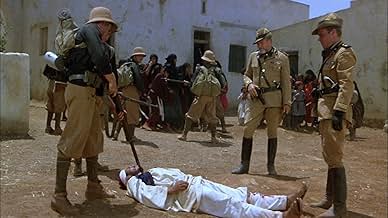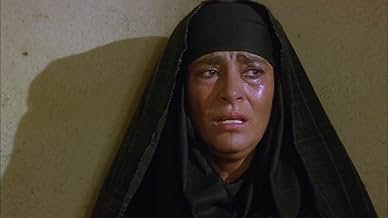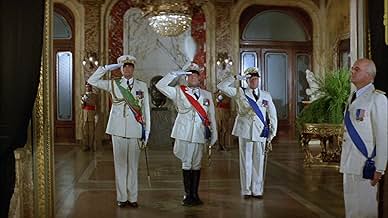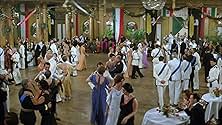In 1929, Italian Fascist dictator Benito Mussolini appoints General Rodolfo Graziani as colonial governor to Italian Libya with orders to stamp-out all resistance from Libyan nationalists le... Read allIn 1929, Italian Fascist dictator Benito Mussolini appoints General Rodolfo Graziani as colonial governor to Italian Libya with orders to stamp-out all resistance from Libyan nationalists led by rebel guerrilla leader Omar Mukhtar.In 1929, Italian Fascist dictator Benito Mussolini appoints General Rodolfo Graziani as colonial governor to Italian Libya with orders to stamp-out all resistance from Libyan nationalists led by rebel guerrilla leader Omar Mukhtar.
- Director
- Writers
- Stars
- Prince Amadeo
- (as Sky Dumont)
- Director
- Writers
- All cast & crew
- Production, box office & more at IMDbPro
Featured reviews
This movie truly shows the the savage means which the conquering Italian army used to treat the Libyan natives. The struggle for freedom took place in the heart of the African desert. Omar Al Mukhtar (The Lion of the Desert), who led the Libyan resistance, a role played in this movie by Anthony Quinn ... this has to be his best ever performance. An Oscar Nominee worth ... nothing less. Director, Moustapha Akkad, who is also famous for the great yet unknown classic Risâlah, al- (1976), gives his best shot at direction here. Excellent work.
Rent this now, if its available, Its worth every penny. You will be the witness of utter brilliance and great performances. Watch it, vote for it, Give it the respect it deserves.
Anthony Quinn (somehow reprising his role in the epic "Lawrence of Arabia") portrays the Libyan Guerilla fighter "Omar Mukhtar" who pledged his (as well as his countrymen's) life to drive the invading Italian forces out.
The story depicts post World War 1, pre WW2 era where Benito Mussolini (played by Rod Steiger) tries carving up the globe with empires for Italy. He uses Libya as an "easy" stepping stone to the the Middle East (Libya's occupation was not started by him.. funny and demagogical enough the young Mussolini demonstrated against the occupation of Libya in 1911).
Mukhtar, the village teacher, on the other hand made this difficult and was so successful waging his campaign against the Italians, that Mussolini sends in his top general "The Butcher" Graziani, played deliciously by the late Sir Oliver Reed (the Trap 1966, The Four Musketeers 1974, Gladiator 2000 and many more) to straighten things out.
First, the Italians just "tour" Libya, raiding, burning, killing and raping... but when an entire attack convoy is completely wiped out by rebels, Graziani decides to wage an all-out war against Libyans. Graziani pretends to come to terms with Mukhtar, but, at the same time, brings thousands of fresh Italian troops to Tripoli and marches them inland. He is the first general to use planes and tanks in the desert, destroying town after town. This way he successfully corners Mukhtar and his rebels in the mountains.
Historically accurate, in its portrayal of the Italian army and of the campaign itself, Lion of the Desert is an action packed, nearly (I say nearly..) flawless epic war film.
Rod Steiger starts with some over-acting marching around his offices barking at people. But the film quickly shifts towards the vastness and splendor of the Sahara desert. It has excellent action sequences, that employ splendid special effects and lots of stunt work.
On top of this, it's one of the bloodiest war films I've seen, with bullet wounds spraying blood and people smashed to pulps by Italian tanks. God knows how this film faded away with a mediocre rating, but then again noone really saw the film right?
The film is also a fascinating portrayal of the Arabs way of life and how it conflicts with European ideals.
The musical score of this film, by Maurice Jarre (Lawrence of Arabia), is only great at times, but often seems uninspired and lame compared to his previous works on David Lean's great films.
The cinematography and editing are classy, (one con though.. the cameras seemed a little shy of hanging around close to the big gasoline truck explosion. The best scenes in the film are battle scenes, one involving a vast army of extras destroying a nearly helpless arab village, another with Graziani's army battling the Libyans for control of a mountain bridge. Other than those two, I can't say great about the 3 or so other battle scenes (compared to these two).The overall effect of battle senes is though quite satisfying.
The cast of this film, doesn't lack big-names like Irene Papas and Sir John Gielgud but the roles were inconsequential as Mukhtar's friends. Then, there's a lot of the old Italian B-movie stars in small roles as Italian soldiers and aides..
Akkad's strong point seems to be showing Italian artillery blowing the bewildered Bedouin warriors while his weak point seems to be spending the money. The film didn't really need the lavishness and authenticity of the picture. Do you really have to hire thousands of extras and build many many replica tanks just to go destroy them for the authenticy? No surprise this movie lost money, but the fact that it made almost no money astonishes me. Could be cause early 1980´s were wrong timing for an epic film. People watched "The Empire Strikes Back" and didn't want to see a thorough recreation of some war, most never heard of.
Lion of the Desert may not be perfect, but it's just as splendid a viewing as any of the old big-budget war films like Lawrence of Arabia and Doctor Zhivago, only this one's got a bit more action and politically ignored (as propoganda or is it the propoganda that endorses ignoring it??).
I highly recommend seeing the DVD in Widescreen, crisp quality and good 5.1 Dolby Digital sound, plus lots of informative extra features.
Director Moustapha Akkad (The Message) clearly learnt a few lessons from "Lawrence of Arabia", mainly how best to use the charismatic Anthony Quinn. As Mukhtar, Quinn gives a nuanced portrayal of compassion and wisdom. Whenever he features in a scene, it becomes impossible to tear one's eyes off the screen. Thankfully, Oliver Reed proves a magnificently cruel and seething counterpoint as General Graziani. Irene Papas provides strong supporting work and Rod Steiger turns in a delightful cameo as Benito Musslini.
Moustapha Akkad uses a solid structure and keeps it riveting throughout, extracting fine performances from all his actors and technical collaborators. Where "The Message" was impressive but cold (due to its invisible hero and reverence), "Lion in the Desert" has an emotional core and throws up scene after impressive scene. The desert battle scenes are incredibly messy and savage and have a sense of multiple individual action amid chaos, rather than elaborate choreography. This perfectly suits the theme of Bedouin guerrilla. Production values are considerable and Maurice Jarre provides one of his most underrated scores.
Some viewers will find qualms with the fact that, despite the coda that proclaims that Lybia managed to liberate itself, the country was then for long under the oppressive rule of Kadaffi. In truth, this little addition might have something to do with the fact that Kadaffi assisted in funding the film. If you can overlook this (not to difficult), you can appreciate the true focus: Mukhtar. This remains a beautiful film about a people's resistance.
"Lion in the Desert" is an important film, if only because it offers a very accessible (to Western audiences) Arab perspective. It is also impressively well made: an accomplished chapter in the era of great epics that flourished with David Lean's masterpieces and ended with Richard Attenbourgh's Gandhi.
See this!
The Arab-American Moustapha Akkad produced and directed the film in Libya with Gaddafi's full support. The film is reasonably accurate and, in my opinion, fair and balanced. Anthony Quinn had a long and distinguished career playing 'ethnic types' and his portrayal of Omar Mukhtar is undoubtedly one of his finest performances. Omar in the film is probably much more of an action man than the real Mukhtar who was more of a strategist than a fighter. Or so I was informed whilst on holiday in Tunisia. The film is (understandably) one of the most famous in the Arab world, dealing as it does with Arab suffering under recent European colonialism.
Akkad uses original black and white archive film to underpin its historical authenticity. At the start to set the scene of the Italian conquest of Libya from Turkey in 1911. In the middle to show an aerial view of the concentration camps built by the Italians and also the barbed wire 'Hadrian's Wall' built along the Egyptian border. Both these strategies were intended to cut off Mukhtar from his supply sources. At the end of the film there are still photos of the real Mukhtar in chains and also of the main Italian protagonists we see in the film.
Rod Steiger blusters through his role as Mussolini, the fascist dictator who wants to send Italian colonists to a peaceful Libya, an ambition being thwarted by Omar Mukhtar's stubborn 20-year long armed resistance. Oliver Reed plays a suitably ruthless General Graziani, the man charged with crushing Mukhtar. But his character is no two-dimensional brute.There is a very engaging private dialogue between himself and the captive Mukhtar. The two men debate historic claims to Libyan soil, with Graziani pointing out that the Romans were there before the Arabs. Reed gives a very controlled performance, one of his best.
The film is very balanced in its portrayal of the Italians. On the one hand we see some terrible reprisals-shootings and hangings-against civilians. On the other hand we have two sympathetic Italian officers whose conscience is afflicted by by the war they are forced to wage. The Raf Vallone character is particularly sympathetic- very courteous, generous and kind to the captive Mukhtar. This is history telling at its best. Italian fascists were not all the same. Individuals matter. Likewise, the Italian officer chosen to defend Omar at his trial argues that Mukhtar never committed treason against the Italian state because he never accepted it rule.
On the Arab side we have John Gielgud playing the high-ranking Sharif el-Gariani character who is sent to ask Omar to end his struggle. Some Arabs were willing to collaborate with an Italian rule which was helping to modernise their country. There is a nice reference to the fact that 'the League of Nations will not help you', highlighting the limitations of this predecessor of the UN. Come to think of it, things have not changed very much!
The action scenes are spectacular, with some inspiring ambushes by the insurgents against the Italian forces. The film credits Graziani (wrongly?) with being the first general to bring tanks into the desert. The Italian assault on the oasis town of Kufra is a theatrical masterpiece. Some viewers may think that all this is probably a bit over the top. It probably is but it certainly boosts the film's entertainment level. In fact, the film could have shown Italian planes dropping poison gas bombs as they did in Abyssinia a few years later. In his biography of Mussolini, the eminent historian Denis Mack Smith maintains that this did happen in Libya.
The music is very effective and the film is emotionally charged throughout, especially during the hanging scenes. The Omar Mukhtar character is accorded a great deal of dignity and honour. The film is hagiography but so are 'Spartacus', 'Ben-Hur', 'El Cid' and scores of other epics. Does this make the film a piece of Arab propaganda? Yes and no. The film emphasises the central role of Islam in giving Omar the inner strength to continue his fight. It tells an historical tale with a great deal of accuracy but it is also a feature film which aims to entertain. In that respect it is no different to any Hollywood blockbuster about the Alamo or Pearl Harbor. In my opinion it is superior to many such blockbusters. It's just that white Caucasians have to get used to being the bad guys for a change.
Gaddafi is now coming in from the cold and opening up his country to tourism. I can only hope that this will result in the film becoming more widely available and better-known in the UK. 'Lion of the Desert' is an excellent historical epic which tells one side of the story. Some historians would argue that Mukhtar's defeat and death paved the way for the enlightened rule of Italo Balbo who governed a 'pacified' Libya after 1934 with few executions and much building of infrastructure. I would not accept this view as all imperialisms are self-justifying and ultimately unacceptable.
Did you know
- TriviaThe production's obsession with authenticity extended right down to the same barber who used to shave Benito Mussolini's head being hired to shave Rod Steiger's, the actor who played him.
- GoofsMussolini is talking to Graziani in the opening when he looks the map of Libya, and says that all the green land is for Italy, but this is a topographical map that shows land greener as it becomes lower by sea level. Ninety percent of the area of Libya is desert.
- Quotes
Omar Mukhtar: We will never surrender. We win or we die. And don't think it stops there. You will have the next generation to fight; and after the next, the next. As for me, I will live longer than my hangman.
- Alternate versionsThe U.S.A. Home Video VHS release in the '80s runs 160 minutes. Footage has been added in the Director's Cut released on Anchor Bay Video. This version, released in 1998, runs 206 minutes.
- How long is Lion of the Desert?Powered by Alexa
Details
Box office
- Budget
- $35,000,000 (estimated)
- Runtime2 hours 53 minutes
- Color
- Sound mix
- Aspect ratio
- 2.35 : 1
Contribute to this page



